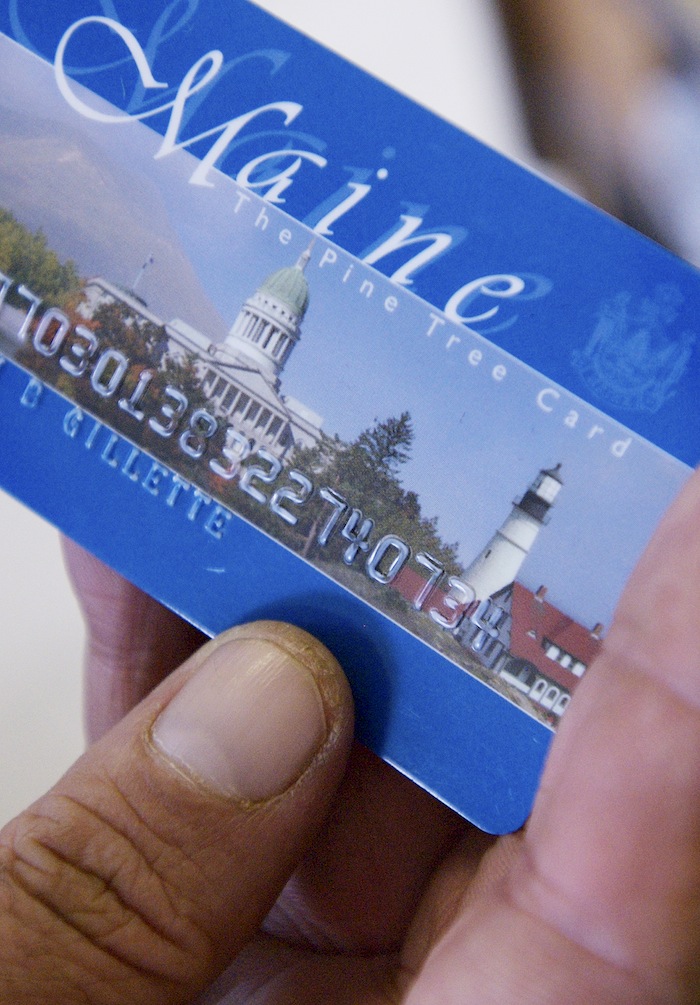AUGUSTA – Federal officials have denied a request by the LePage administration to require Mainers who use food stamps benefits cards to show photo ID when they buy groceries.
The U.S. Department of Agriculture said the requirement would infringe on card holders’ rights and would not fight fraud.
The state sought the waiver in August, saying the cards were being traded for cash or being used by people other than the intended recipients.
In the last legislative session, the governor and the Department of Health and Human Services supported legislation that would have required photo ID. The bill failed, prompting the waiver request.
Almost one in five Mainers receive food stamps. As of January, 253,842 Mainers got an average monthly benefit of about $122.
Recipients’ cards carry balances for the Supplemental Nutrition Assistance Program, which can be used only to buy food for home use, usually at grocery stores or farmers markets. The balances cannot be converted to cash or used to buy alcohol or tobacco.
The cards also can be used for other benefit programs, such as Temporary Assistance to Needy Families or Additional Support for People in Retraining and Education, in which recipients can buy anything.
Andrea Gold, director of the Supplemental Nutrition Assistance Program in the USDA, wrote in a letter to the administration, “After careful review of DHHS’ request and responses, we do not think DHHS’ current waiver request would effectively reduce fraud and abuse of program benefits.”
Further, a waiver would “result in the material impairment of statutory and regulatory rights of SNAP participants,” Gold wrote.
A spokesman for the DHHS declined to comment on the letter Friday.
The request was one anti-fraud measure proposed by Gov. Paul LePage. Federal officials have estimated the level of welfare fraud nationwide at 1 percent of the $75 billion program, $750 million a year.
The level of fraud in Maine is likely about the same, amounting to about $3.7 million a year in a $372 million program, said DHHS spokesman John Martins.
In the last year, the department has increased its anti-fraud efforts, adding a toll-free hotline and a website to report fraud. The department is also hiring eight more fraud investigators.
“We’ve been working diligently on this issue,” Martins said. “It’s a priority for the governor.”
He said the number of tips has doubled, but he had no information about convictions.
In August, the USDA announced new federal rules to combat fraud, including tougher fines or disqualification for retailers who commit fraud, and a provision to let states deny cards to people who seek replacement cards more than three times a year without explanation.
State and federal officials exchanged letters regarding Maine’s request, and Gold noted that the state had no plan for enforcing the proposed change, or any requirement for retailers to keep records or face fines if they didn’t comply.
Gold also pointed out that the DHHS’s proposal didn’t account for how a photo ID rule could be enforced. More than one person in a family is allowed to use a card; Maine’s cards show only the number and name of one household member.
Further, the state hadn’t considered how the rule would work with people holding out-of-state benefits cards, many of which don’t include even the name of a household member.
LePage has submitted many welfare reform bills, including one to ban convicted drug felons from receiving public assistance. Another could allow the state to prohibit the use of food stamps to buy soda. A third, which may be aimed at welfare fraud, could grant additional subpoena powers to the commissioner of the DHHS.
LePage also has supported drug testing for all welfare recipients, although that proposal lost traction because of concerns about costly legal challenges that occurred in Florida.
Noel K. Gallagher can be contacted at 791-6387 or at:
ngallagher@pressherald.com
Send questions/comments to the editors.




Comments are no longer available on this story